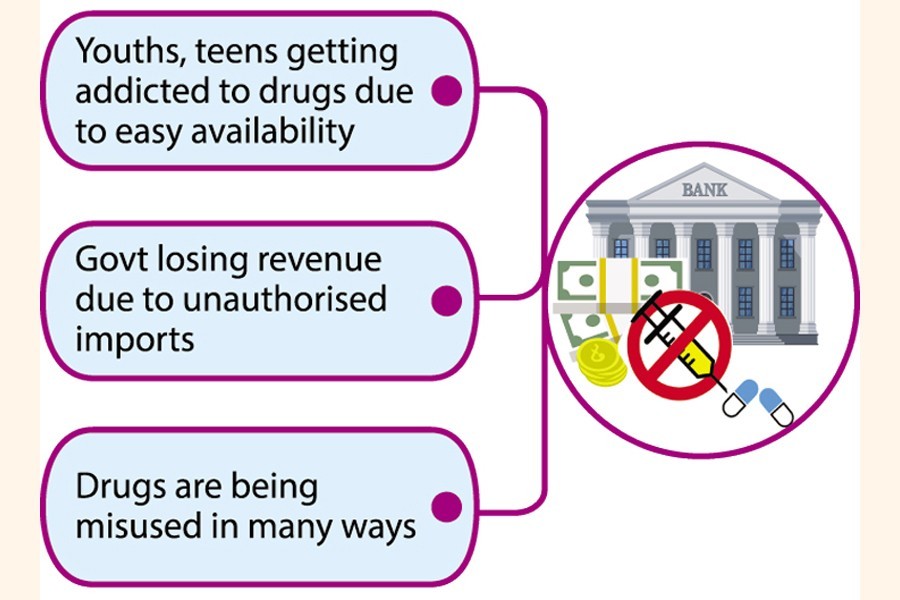Drug-import LC is being restricted as inroads of some unauthorised drugs into Bangladesh are ruining the future of hundreds of thousands of youths and teens, officials say.
They have said a group of unscrupulous businesspeople are importing those illicit drugs without permission from the Department of Narcotics Control (DNC).
The drugs are being imported through opening letter of credit (LC) despite the businesses having no licences from the DNC, they added.
The DNC recently requested the authorities concerned to instruct the commercial banks not to open LC for drug imports by companies without licence or permit, no-objection certificate or prior approval from the department.
Under the preventive move, the sources said, the DNC wrote to the ministry of home affairs to stop such LC opening. The ministry forwarded the instructions to the financial institutions division (FID) to take necessary action.
DNC Director-General Abdul Wahhab Bhuiyan in the letter pointed out that the first schedule of the Narcotics Control Act 2018 (amended in 2020) has the mention of A, B, and C-class drugs.
"Import of these drugs without permission from the DNC is prohibited under sections 9, 10, 11 of the act," the letter reads.
Due to unauthorised imports of the drugs through LC opening, the DG said, the government is also being deprived of a large sum of revenue, while the drugs are being misused in many ways.
According to the Narcotics Control Act, manufacturing, distribution, and trading of yaba is an offence which can bring death penalty upon the convicted persons.
The main substance of yaba tablets is methamphetamine which the act has included as Class-A drug under the first schedule.
The major Class-A drugs include opium tree, opium fruit and seed, cocaine tree, leaves and all kinds of cocaine derivatives, acetyl-methadol, fentanyl, lofentanyl, buprenorphine, clorocodied, etrophine, heroin, codeine, hydromorphine, and ketamine.
Also, amphetamine, acetorphine, cannabis resin, charas, hashis, demeral, desomorphine, naloxone, narcotine, nicodicodine, oxymorphone, parahexyl, and tilidine are on the list as Class-A drugs.
Cannabis, aminoindanes, methylenedioxy, psilocybine, amineptine, amobarbital, cathine, vinylbital, mesocrab, pemoline, pipradrol, shisha, are among the few which were listed as Class-B drugs.
Drugs like methanol, flunitrazepam, alprazolam, camazepam, diazepam, pipardol, oxazepam, vinylbital, zolpidem are of Class-C, as listed in the first schedule of the act.
A senior official at the FID acknowledged having received such a letter from the ministry of home affairs and said the banks will soon be asked to comply with the request.
"The youths and teens are becoming addicted due to the easy availability of drugs, which needs to be given proper attention," he adds.
Sources say the use of illicit drugs, particularly yaba, is on the rise, despite steps taken by DNC and other law-enforcing agencies.
According to the Department of Narcotics Control, the law-enforcement agencies seized 1.3 million Yaba tablets in 2011. The number gradually increased to 1.9 million in 2012, 2.8 million in 2013, 6.7 million in 2014, 20 million in 2015, 29.5 million in 2016, and 40 million in 2017.
In 2018, the number rose to over 53 million, but it declined sharply to 30 million in 2019 - when the law-enforcement agencies launched special drives against drug abuse across the country.
After the crackdown was over, the number climbed back to 36 million in 2020, and to over 53 million in 2021.
Former CEO of Mutual Trust Bank Ltd (MTB) Anis A Khan told the FE illegal entrance of drugs must be contained and the DNC should take strict steps to this end.
"Uncontrolled entrance of drugs is not acceptable anyway," says the senior banker.
Mr Khan thinks banks should follow the law properly before opening LCs for drug import.
"If any importer comes without NOC from narcotics department, the banks should not cooperate with them," he says.
Dr Shoyebur Reza Chowdhury, chief consultant of the Central Drug Addiction Treatment Centre, told the FE earlier around 70 per cent of their patients were Yaba-addicts.
"It indicates how fast drug is spreading across society. We need to make every family aware of the drug. The guardians should regularly inquire about their children, and with whom they meet," he adds.


